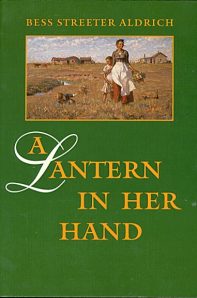A Lantern in Her Hand by Bess Streeter Aldrich
Review by Kathy Friesen
One of the best developed characters in a novel is Abbie Deal in A Lantern in Her Hand by Nebraska author Bess Streeter Aldrich. She is a high-spirited youngster as her mother crosses the prairie from Chicago to a new home in Black Hawk, Iowa with her six children. At night as Abbie and her sister look out the back of their Conestoga wagon, the wind whispers through the tree tops, and she is reminded of her father, who has died two years earlier. One more day and they will reach their destination after a three week journey. She has lofty dreams she hopes to achieve in her lifetime. Abbie wants to sing and dance, paint and be a lovely lady like her ancestor with the long tapered fingers and the pearls framing her face.
By the age of 11, Abbie is expected to contribute to doing many chores, gathering eggs, herding cows and going to school. As she helps the family at their new home on the prairie, she dreams of becoming the lovely lady, the aristocrat in the portrait. Under her bed, her mother keeps her inheritance in a horse-hide box. The loveliest of the treasures is a string of pearls, to someday be worn by one of the daughters in the family of Maggie O’Connor Mackensie, when life is better than living in a sheep shed with a dirt floor and a curtain for the door.
As a teenager, Abbie has a chance to marry Ed Matthews who is in medical school in New York. He could give her a life of luxury in comparison to her childhood, music lessons, acting lessons and a chance to sing on Broadway. She could become the lovely lady, with the long tapered fingers who would wear the pearls under mother’s bed. But could she learn to love him? When the Black Hawk neighbors receive news of the Confederates firing on Fort Sumter, it means war. All the young men want to go. Abbie has the queer sensation of the wind blowing past her, a wind she cannot stop. Even Will Deal goes. Abbie declines Ed Matthews and waits for Will to come home from the War.
Abbie chooses love, and marries Will Deal after the War. They soon decide to homestead in Nebraska. Though life is difficult, there is always hope for a better situation. But there is always the wind, rushing by her face as though life is passing by too quickly. She cannot stay the hands of the clock.
She begins to see in her children glimpses of the dreams she once held for herself: to paint, to sing and be the lovely lady with the long tapered fingers. Abbie and Will sacrifice so the children have the opportunities of education and dreams fulfilled. After Will’s tragic death, Abbie must face life alone. In her troubles, she talks to Will; and he reassures her. The children don’t understand why she stays by herself at the farm, now at the edge of Cedartown. As Abbie goes about her daily routine, she feels the wind rush by her face, time moving too quickly. She cannot stay the hands of the clock. All these years she has kept under her bed, in a horse hair box the lovely strand of pearls from her mother’s aristocratic ancestor. Who will finally wear the pearls, she wonders?
By now her children and most of her grandchildren are all grown, talented and successful in their endeavors. They are busy. Only she hears the wind rushing by so quickly; and only little Laura has time to listen to Abbie’s stories. After the wedding of Mack’s daughter, the children want her to stay in Lincoln or Omaha with them. But Abbie wants to return to her home. She tells them, when you live alone, you don’t mind it so much.
As she makes supper, she hears the children playing out in the yard and Will comes in for supper. Abbie is confused and lays down to rest. The wind no longer brushes by Abbies’ face, but the clock ticks on. The neighbors find her as her supper burns on the stove. The children are so conflicted that no one was with their mother Abbie at her end.
A Lantern in Her Hand should be required reading for every Nebraskan, whether born here or landed here by some celestial move. Bess Streeter Aldrich captures the unique psyche and past life style of the people on the plains. As the wind continues to blow by our faces today, the hands on the clock cannot be stayed. Our lives go quickly by, just like Abbie’s. Time is too short, we realize as the decades roll by us.


































